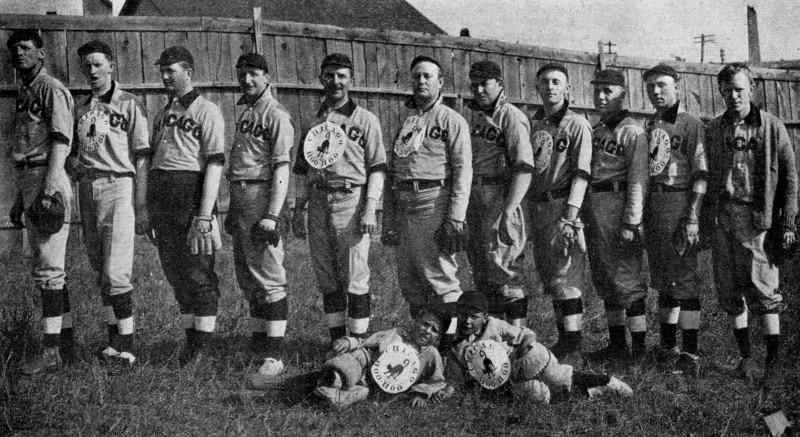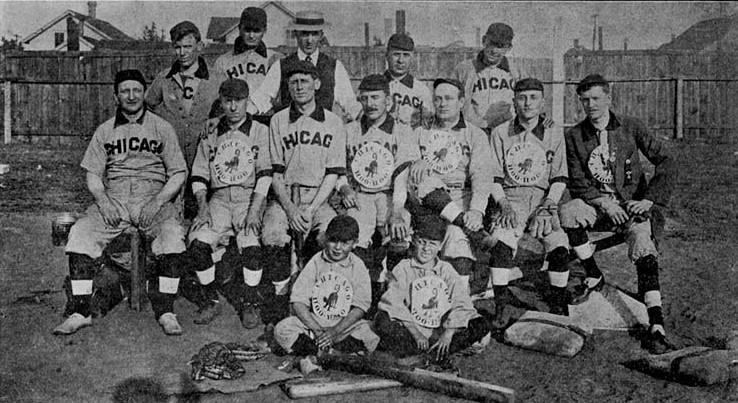The Greatest Baseball Championship Series Ever Played
The debate can now be settled. We know what the greatest championship series in baseball history is. It's certainly not the 2014 San Francisco-Kansas City match-up, though that's been entertaining.
What championship am I talking about? The year was 1908. Theodore "Big Stick" Roosevelt was finishing his second term as president. "Big Bill" Taft was running on the Republican ticket to succeed his friend and was taking on William Jennings Bryan, aka "The Great Commoner." (This may have been the Progressive Era, but it was also the era of the best sports nicknames. Who could ever forget players like "Wee Willie" McGill, "Handsome" Griffin, or "Postscript" Fletcher? Even the head umpire of the series was nicknamed "Dusty"!)
The teams hailed from Chicago and Indianapolis and met on a sun-baked field in Michigan City, Indiana, for the first game. It had all the trappings of the modern game: two teams loaded with stars, two umpires, clean uniforms. See for yourself.
Oh, did I mention that this was the Hoo-Hoo's World Series? After all, lumber mills were big sponsors of teams back then. Nevertheless, there were bragging rights on the line. We'll let our intrepid reporter take it from here:
At 1 o’clock the invading army of black cats took Michigan City without a struggle, the natives firing only one shot, that being from the artillery of a photographer. Immediately upon the landing of the steamer a brass band headed the line and the cavalcade proceeded to the park, where it was successfully photographed, and then steered to a great refreshment hall, where it was very successfully fed. The local accommodations for caring for the big crowd were found to be excellent and the hunger of all was satisfied without serious difficulty.
The chief event of the afternoon was the baseball game. Immediately after the luncheon the Hoo-Hoo and their ladies proceeded in a body to the b.p., meaning not baseball park but boiling point. The Northern Indiana penitentiary formed an appropriate background to this travesty on a baseball field. The sun turned all its calcium effects upon two inches of red hot sand, in which the athletes were compelled to disport themselves. The game itself was a contest between two teams selected from the lumbermen of Indianapolis and Chicago. They were made up as follows:

Two more formidable teams have never taken the field to battle for a title.
Just before the teams took the field E. F. Dodge, of Chicago, called [umpires] C. D. Rourke, of Urbana, Ill., and George Palmer, of Indianapolis, Ind., to the plate and presented one with a horse pistol and the other with a shotgun. Some of the decisions later proved that this was a wise precaution, undoubtedly saving both umpires from the fury of the populace.
Indianapolis won the game in the first inning, the Chicago team going up in the aeroplane a la Wright Bros. The procession of Indianapolis runs took ten minutes to pass a given point.
Pitcher Fox appeared to be a stranger in the neighborhood and was unable to locate the plate. He gave Mercer and Geisel, the first two men up, passes to first, and then Johnson started a grounder to first, which got through Saye's legs and caromed into right field, Mercer and Geisel scoring. Avery struck out, but a passed ball assisted Johnson to third, from which he scored when Pritchard singled. Pritchard stole third, but expired there on infield outs of West and Maas.
In the third inning Giesel drew a base on balls, but was forced at second, McGill to Larson, on Johnson's grounder. Avery's single advanced Johnson a base and he scored when Lewis threw over Fletcher's head. Pritchard grounded, McGill to Saye. West struck out.
Chicago got its lone tally in this inning and might have had more but for some bad base running. Larson opened with a beautiful two-base hit and went to third on a wild pitch. Matthias struck out, but Dodge singled through the box, scoring Larson. When Fletcher flied to Mercer, Dodge led away off and was easily doubled, Mercer to Pritchard.
During the four succeeding innings the two teams played airtight baseball, but thirteen Indianapolis men and twelve Chicago men going to bat. Fox opened the fifth inning with a single, but was nailed at second when he attempted to steal with the ball in the pitcher's hands. Hamilton singled in the seventh with two out and was left at first.
The fielding features of the game were supplied by Fox, McGill, and Pritchard. W. H. Johnson, who besides being a good ball player is president of the Indiana Retail Lumber Dealers' Association, gave a fine exhibition of backstopping. Wee Willie McGill accepted three chances at second without error. Postscript Fletcher did not have a chance at third, or undoubtedly would be included in the special mention column. The managing of Handsome Griffin was also a conspicuous feature. The score:

Immediately after the ball game the Hoo-Hoo and their ladies, many of whom had entertained themselves about Michigan City rather than swelter at the ball park or approach so dangerously close to the penitentiary, again boarded the [steamer] Theodore Roosevelt and enjoyed a beautiful twilight and moonlight trip homeward to Chicago. On the way they were entertained with music by talented vocalists and with explanations from members of the Chicago team.
That's right. The Chicago players spent part of the trip home making excuses for the loss. I wonder what they said after Game 2, played ten days later in Indianapolis.

The losers from Chicago.
Because once again, the Windy City Boys turned in a poor performance, this time getting shellacked 23-3, committing 12 errors, and not scoring their first run until the 7th inning. Let's go back to our reporter, who appears to be making excuses for the Chicagoans:
Because of the wide difference in the score there was not much excitement, but what the game lacked in excitement was made up in fun. The local team is composed largely of big men who do not often indulge in such exertion as playing ball, most of them being office men. Until noon Monday part of the local team had not reported at their offices for work.

The victorious team from Indianapolis.
The third and final game was played in Chicago. By then, the Hoosiers had already won the 3-game series, so their incentive to play all-out was not very great. Still, Chicago had to rally from 3 runs down to win 8-4.
A week later the Chicago Cubs won their last World Series title. Perhaps instead of a billy goat, their fans should bring a black cat to Wrigley Field to break the curse.

What we like to think might have been the pennant won by the Hoosiers!


